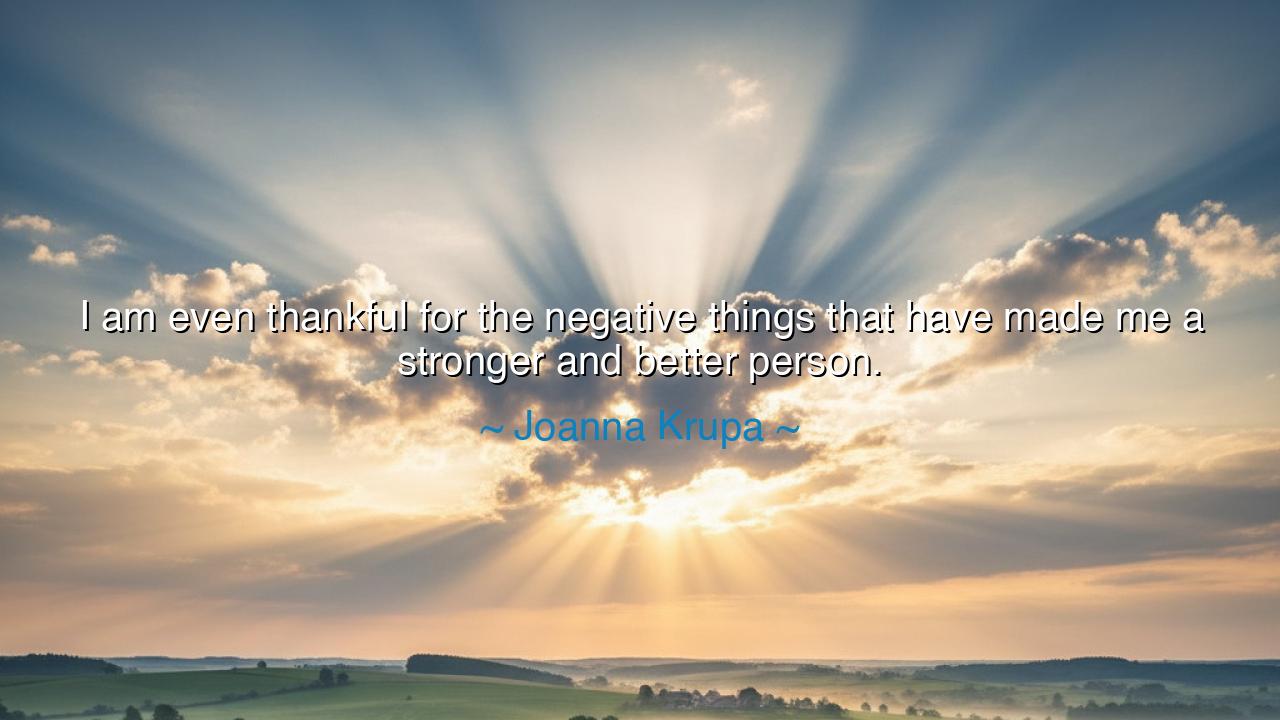
I am even thankful for the negative things that have made me a
I am even thankful for the negative things that have made me a stronger and better person.






Hear the words of Joanna Krupa, who spoke with courage born of trial: “I am even thankful for the negative things that have made me a stronger and better person.” These are not the words of one who has walked only on smooth paths, but of one who has stumbled on stones, faced storms, and emerged with deeper strength. For she declares that even suffering, even loss, even hardship, can be transfigured into blessing when the heart receives them with gratitude.
The ancients knew this truth and clothed it in their wisdom. The Stoic philosophers, hardened by war and exile, taught that no misfortune is wasted if it is received with the right spirit. Marcus Aurelius, emperor of Rome, faced betrayal, sickness, and endless wars, yet in his Meditations he wrote: “What stands in the way becomes the way.” Like Krupa, he saw that the negative things are not only obstacles, but teachers that mold us into stronger and wiser beings. To be thankful for them is to master them, to prevent them from mastering us.
Her words call us to see pain not as the enemy, but as the furnace of transformation. Gold is refined only by fire, and the human spirit is strengthened only by trial. The negative things—criticism, failure, rejection, disappointment—become the very stones upon which greatness is built. Without them, our victories would be shallow, our strength untested. Krupa proclaims her thankfulness because she knows that without these trials, she would not be the person she has become.
Consider the story of Nelson Mandela, who endured twenty-seven years in prison. To most, such a fate would seem unbearable, crushing the soul. Yet Mandela emerged not broken, but stronger, wiser, and filled with a vision of reconciliation. He later confessed that prison taught him patience, endurance, and a deeper love for freedom. Like Krupa, he was thankful even for his negative things, for they shaped him into the leader who would change a nation.
There is also humility in her declaration. Many hide from their scars, ashamed of failure or pain. Yet she does not deny them—she embraces them. To be thankful even for suffering is to walk in the freedom of truth, no longer fearing what others may think of your wounds. It is to say: “These hardships did not defeat me. They made me.” Such gratitude is heroic, for it transforms bitterness into wisdom and shame into power.
The origin of this wisdom lies in the eternal rhythm of life itself. Night follows day, storms follow calm, winter follows summer. To resist this rhythm is to live in despair; to accept it is to find peace; but to be thankful for it is to find true strength. For the soul that gives thanks even for darkness finds light in all things, and no misfortune can rob them of victory.
The lesson is clear: do not curse your hardships, but search for the strength they are planting within you. Be thankful not only for your blessings, but for your battles. For the sunshine warms you, but the storm shapes you. The praise lifts you, but the criticism sharpens you. The easy path comforts you, but the hard path transforms you. To embrace this truth is to grow into the fullness of the person you were meant to be.
Practical wisdom calls you to action: the next time you face a trial, pause before anger or despair. Ask yourself: “What strength can this give me? What lesson does this pain carry?” Then speak gratitude, even through clenched teeth, for the gift hidden in the wound. In doing so, you will walk in the path of the ancients and the wise, and like Joanna Krupa, you will one day say with confidence: “I am thankful even for the negative things, for they have made me stronger and better.”






AAdministratorAdministrator
Welcome, honored guests. Please leave a comment, we will respond soon